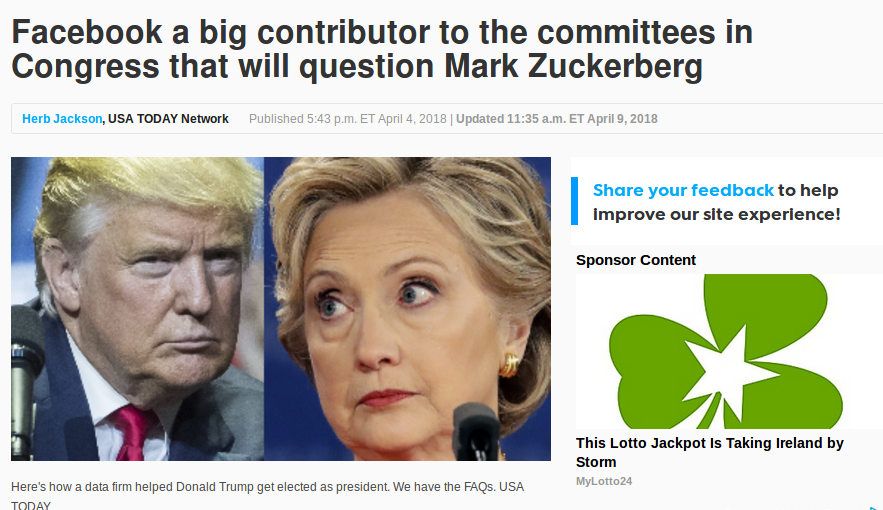The AYLIEN News API gathers, analyzes, and indexes stories from tens of thousands of publishers as they are published, giving us a vast, live dataset that is updated in near-real time. In April, the News API gathered over 3.5 million stories, and we thought we’d look into these stories to see what we could find out about the press coverage of a topic people are concerned about at the moment - Facebook’s use of its users’ personal data. April was full of news topics stemming from the Cambridge Analytica revelations in March, including the CEO of Facebook testifying in front of Congress and the CEO of WhatsApp (owned by Facebook) quitting over privacy concerns. With the amount of popular attention focused on personal data usage, we thought we’d see what trends in news publishing we could find. To look into this, we’re going to:
- See if people are still talking about Cambridge Analytica, the focus of the story that sparked this interest in personal data;
- Look into the coverage of Mark Zuckerberg’s Congressional hearing last month;
- See what the reaction was to the CEO of WhatsApp resigning over privacy concerns.
Are People Still Interested in Cambridge Analytica?
It has been over six weeks since Christopher Wylie turned the global conversation about technology and politics towards what happens with information gathered about us online. Using the News API’s Time Series endpoint we can track the volume of stories about topics over time - just make a query with a search term and a date range and it will return the volume of stories your that your search term appeared in during that date range. On the chart below, we’ve plotted the daily volume of stories that mention “Cambridge Analytica” in the title.
You can see that the volume of stories spiked in the initial aftermath of Wylie’s disclosures, spiked again on the week of Zuckerberg’s testimony, but has fallen off dramatically since then. It looks like the initial news cycle around Cambridge Analytica ended before the company announced on Tuesday (May 1).
Mark Zuckerberg’s Congressional Hearing
On April 10, Mark Zuckerberg testified in front of Congress about Facebook’s role in, and response to the use of its users’ data by Cambridge Analytica to influence voters. To see the volume of coverage and the sentiment of this coverage at the same time, we used the Time Series endpoint again and plotted the results on a chart below. You can see that the sentiment toward Facebook has been very negative for the entire month, with a spike on the day of the hearing:
We also used the Stories endpoint to check what the most popular story was on Facebook on the day of the hearing. Interestingly, the most-shared story on Facebook was a story covering how almost all of the Representatives grilling Zuckerberg had accepted donations from the company, suggesting that Facebook users viewed political authorities with just as much suspicion as they did Facebook itself. 
Given the interest in Zuckerberg’s congressional hearing last month, we thought we’d look into the the coverage of Facebook-owned WhatsApp. News about WhatsApp last month was dominated by two events, both to do with data protection and user privacy take a look at the spikes in story volume on the chart below.
Using the Stories endpoint again, we can search the stories published about WhatsApp on these days. On the 25th, we found that news was dominated by stories about WhatsApp increasing its minimum age from 13 to 16 to comply with the Europe-wide General Data Protection Regulation (coming into effect in May). On the 30th, the focus was on WhatsApp’s co-founder and CEO resigning over user data and privacy concerns, capping off a month that was dominated by user data controversies for Facebook.
Was it a similarly bad month for Twitter?
Compared to Facebook, Twitter had quite a good month of publicity - the company announced its second profitable quarter in a row, and from the chart below you can see how this announcement prompted a spike in coverage on the 25th.
The News API gathered over 3.5 million stories last month and using this content as a data source can be extremely powerful in building a personalized news feed, analyzing trends in news content, or powering an intelligent news app. If you want to try it out, click on the link below to start a free, two-week trial. 
You can see that the volume of stories spiked in the initial aftermath of Wylie’s disclosures, spiked again on the week of Zuckerberg’s testimony, but has fallen off dramatically since then. It looks like the initial news cycle around Cambridge Analytica ended before the company announced on Tuesday (May 1).
Mark Zuckerberg’s Congressional Hearing
On April 10, Mark Zuckerberg testified in front of Congress about Facebook’s role in, and response to the use of its users’ data by Cambridge Analytica to influence voters. To see the volume of coverage and the sentiment of this coverage at the same time, we used the Time Series endpoint again and plotted the results on a chart below. You can see that the sentiment toward Facebook has been very negative for the entire month, with a spike on the day of the hearing:
We also used the Stories endpoint to check what the most popular story was on Facebook on the day of the hearing. Interestingly, the most-shared story on Facebook was a story covering how almost all of the Representatives grilling Zuckerberg had accepted donations from the company, suggesting that Facebook users viewed political authorities with just as much suspicion as they did Facebook itself.

Given the interest in Zuckerberg’s congressional hearing last month, we thought we’d look into the the coverage of Facebook-owned WhatsApp. News about WhatsApp last month was dominated by two events, both to do with data protection and user privacy take a look at the spikes in story volume on the chart below.
Using the Stories endpoint again, we can search the stories published about WhatsApp on these days. On the 25th, we found that news was dominated by stories about WhatsApp increasing its minimum age from 13 to 16 to comply with the Europe-wide General Data Protection Regulation (coming into effect in May). On the 30th, the focus was on WhatsApp’s co-founder and CEO resigning over user data and privacy concerns, capping off a month that was dominated by user data controversies for Facebook.
Was it a similarly bad month for Twitter?
Compared to Facebook, Twitter had quite a good month of publicity - the company announced its second profitable quarter in a row, and from the chart below you can see how this announcement prompted a spike in coverage on the 25th.
The News API gathered over 3.5 million stories last month and using this content as a data source can be extremely powerful in building a personalized news feed, analyzing trends in news content, or powering an intelligent news app. If you want to try it out, click on the link below to start a free, two-week trial. 
Related Content
-
 General
General16 Feb, 2024
Why AI-powered news data is a crucial component for GRC platforms

Ross Hamer
4 Min Read
-
 General
General24 Oct, 2023
Introducing Quantexa News Intelligence

Ross Hamer
5 Min Read
-
 Product
Product15 Mar, 2023
Introducing an even better Quantexa News Intelligence app experience

Ross Hamer
4 Min Read
Stay Informed
From time to time, we would like to contact you about our products and services via email.
